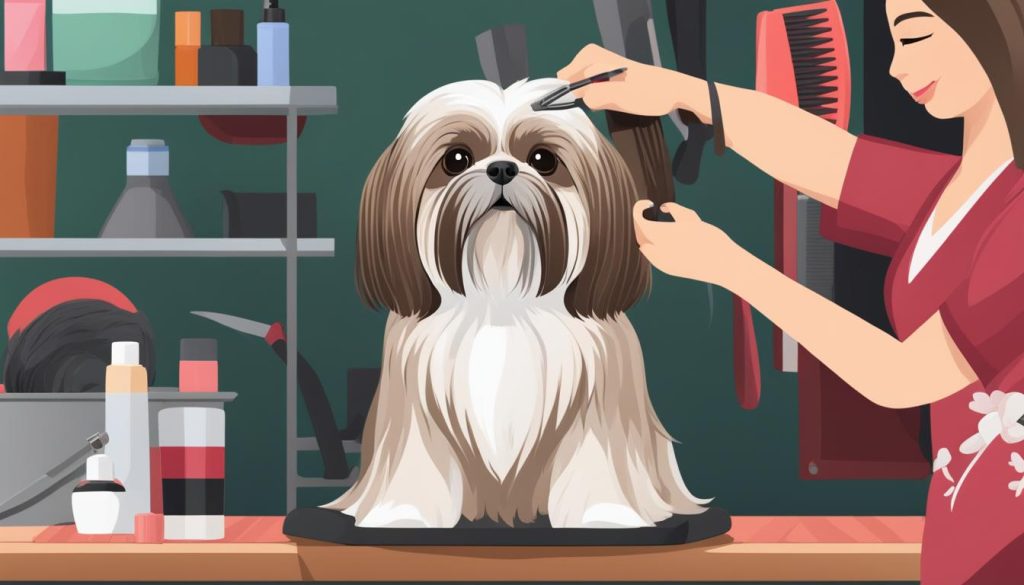Are Shih Tzus good family dogs? This question often arises when considering bringing a furry companion into your home. Shih Tzus, with their charming appearance and affectionate nature, can indeed make wonderful family pets. Let’s explore the qualities that make them an ideal choice for families.
The Shih Tzu breed has a rich history, originating in Tibet and later gaining popularity among royalty and aristocrats across Asia. These adorable dogs have a reputation for being gentle, loving, and adaptable, making them well-suited for family life.
When it comes to children, Shih Tzus are often very tolerant and enjoy being part of a family environment. Their affectionate nature allows them to bond easily with both adults and kids, fostering a strong sense of companionship.
However, while Shih Tzus can thrive in a family setting, they do require proper care, attention, and training. Understanding their temperament, grooming needs, and potential health issues is crucial to ensure a harmonious relationship with these furry family members.
Key Takeaways
- Shih Tzus can make excellent family pets, thanks to their gentle and loving nature.
- They are generally tolerant of children and enjoy being part of a family environment.
- Proper care, attention, and training are essential for a successful relationship with a Shih Tzu.
- Understanding their temperament, grooming needs, and potential health issues is crucial.
- Consider your family’s lifestyle and ability to meet the needs of a Shih Tzu before bringing one into your home.
The History of Shih Tzus

The Shih Tzu breed has a rich and fascinating history that dates back to ancient times. Originating in Tibet, these dogs were highly esteemed and cherished by Tibetan monks who believed they possessed spiritual qualities. They were known as “little lions,” reflecting their courage and dignified nature.
During the Ming Dynasty in China, the Shih Tzu breed was further refined and became highly sought after by Chinese emperors. These regal dogs were considered a symbol of good luck and were often kept in palaces and royal households. Their popularity extended beyond China, and they eventually became beloved pets of nobility and aristocrats across Asia.
It wasn’t until the 1930s that the breed made its way to England, where it experienced a resurgence in popularity. Queen Elizabeth II was particularly fond of Shih Tzus, and her own dogs played a significant role in promoting the breed. In 1969, the American Kennel Club officially recognized the Shih Tzu as a distinct breed.
| Key Highlights of Shih Tzu History | |
|---|---|
| Origin | Tibet |
| Significance | Guardians of Tibetan monasteries Pets of Chinese emperors and nobility |
| Resurgence | England in the 1930s |
| Recognition | American Kennel Club in 1969 |
Today, Shih Tzus continue to capture hearts with their adorable appearance and charming personality. Their storied history adds to their allure, making them a popular breed among dog lovers around the world.
The Origin of Shih Tzus
The Shih Tzu breed originated in the mountainous region of Tibet, where they were bred by Tibetan monks. These monks highly valued the breed for its loyalty, intelligence, and ability to serve as reliable watchdogs. The Shih Tzus’ name, which translates to “lion dog,” reflects their lion-like appearance and regal bearing.
From Tibet, the breed made its way to China, where they were considered a precious treasure. Chinese emperors and the aristocracy adored these small, elegant dogs and often kept them as companions and symbols of wealth and prosperity.
Over time, the breed’s popularity spread throughout Asia, and they became deeply entrenched in the cultural fabric of countries like China, Japan, and Korea. It was their association with the Chinese imperial court that elevated their status and made them highly sought after by nobles and royal families across the region.
Understanding Temperament and Personality

A dog’s temperament and personality play a crucial role in determining its compatibility with different households. When it comes to Shih Tzus, understanding their temperament and personality traits is essential for potential owners. While it is not possible to accurately predict a dog’s temperament, researching a breed’s common temperament traits can provide a general idea.
Shih Tzus are known for their affectionate and loving nature. They thrive on human attention and love to be a part of their family’s daily activities. Their friendly and gentle disposition makes them great companions for families of all sizes. However, each dog is an individual, and their temperament can be influenced by genetics, socialization, and training.
When considering a Shih Tzu as a family dog, it is essential to evaluate the dog’s temperament and personality before bringing them home. Interaction with the dog and observing their behavior can help assess their compatibility with children, other pets, and the overall family dynamic. It is recommended to visit reputable breeders or shelters to meet and interact with different Shih Tzus to find the one that best matches your family’s needs and lifestyle.
Temperament Traits
“Shih Tzus are affectionate and loving dogs that thrive on human attention. Their gentle nature makes them great companions for families.”
Personality Factors
- Genetics: The inherent traits and characteristics that are passed down through generations.
- Environment: The surroundings, socialization, and training that influence a dog’s behavioral development.
- Training: The techniques and consistency in teaching a dog acceptable behaviors and commands.
By considering these factors and taking the time to understand a Shih Tzu’s temperament and personality, families can make an informed decision about whether this breed is the right fit for their home. It is important to provide proper care, attention, and training to ensure a harmonious relationship with a Shih Tzu that will bring joy and companionship to the entire family.
Shih Tzu Care and Physical Needs

Proper care and attention are essential for ensuring the well-being of your Shih Tzu. In this section, we will explore the grooming, exercise, and health needs of this breed.
Grooming
Shih Tzus have a long, silky coat that requires regular grooming to keep it clean and free from tangles. Daily brushing is necessary to prevent matting, and a bath every 2-3 weeks helps maintain their coat’s shine. It’s important to use dog-specific shampoos and conditioners to avoid skin irritations. Additionally, regular check-ups at the groomer may be necessary to trim their nails and keep their ears clean.
Exercise
While Shih Tzus have a moderate energy level, they still require daily exercise to stay healthy and happy. Taking them for a walk or engaging in playtime activities can help burn off excess energy and prevent obesity. Keep in mind that Shih Tzus are brachycephalic, meaning they have a shortened muzzle, which can lead to respiratory issues. Avoid strenuous activities in hot weather and provide plenty of water breaks during exercise.
Health Needs
Like any other breed, Shih Tzus are prone to certain health conditions. Dental problems, such as periodontal disease, are common, so regular teeth brushing and dental check-ups are crucial. They may also suffer from respiratory issues and eye disorders, such as dry eye and cataracts. Regular visits to the veterinarian for check-ups, vaccinations, and preventive care are essential for maintaining their overall health and detecting any potential issues early.
| Grooming | Exercise | Health Needs |
|---|---|---|
| Regular brushing and bathing | Daily exercise through walks and playtime | Regular veterinary check-ups |
| Professional grooming for nail trimming and ear cleaning | Avoid strenuous activities in hot weather | Dental care and monitoring of respiratory and eye health |
Training a Shih Tzu

Training a Shih Tzu can be a rewarding experience, but it requires patience, consistency, and positive reinforcement. These intelligent and eager-to-please dogs respond well to gentle training methods that focus on rewards and praise.
Training Tips for Shih Tzus
- Start training early: Begin training your Shih Tzu as soon as you bring them home. Early socialization and basic obedience training will help shape their behavior and ensure they grow into well-behaved adult dogs.
- Use positive reinforcement: Shih Tzus thrive on positive reinforcement, so reward them with treats, praise, and affection when they exhibit desired behaviors. This will motivate them to repeat those behaviors in the future.
- Be consistent: Establish a consistent routine and set clear rules and boundaries for your Shih Tzu. Consistency is key to successful training and prevents confusion for your furry friend.
- Keep training sessions short and fun: Shih Tzus have short attention spans, so keep training sessions brief and engaging. Make it fun by incorporating play and rewards into the training process.
Shih Tzu Obedience
While Shih Tzus are generally intelligent and trainable, they can sometimes be stubborn or independent. Obedience classes can be beneficial for both you and your Shih Tzu, as they provide structured training with a professional instructor.
Training a Shih Tzu requires consistency and patience. They may have some difficulties during the training process, but with positive reinforcement and a consistent approach, you can teach them obedience and good manners.
Remember that each Shih Tzu is unique, so tailor your training approach to suit their individual personality and temperament. With the right training techniques and plenty of love and patience, your Shih Tzu can become a well-behaved and obedient companion.
Shih Tzus and Family Life

Shih Tzus are known for their affectionate nature and make great family pets. They thrive on human attention and enjoy being part of a family environment. Shih Tzus can be tolerant of children and are generally good with them. However, it is important to supervise interactions between young children and dogs to ensure both parties are safe and comfortable.
When introducing a Shih Tzu to your family, it is essential to provide proper training and socialization from an early age. This will help them develop good manners and behavior around children. Teaching children how to interact with a Shih Tzu, such as gentle handling and respecting their personal space, is also crucial for creating a harmonious bond.
Please be aware that Shih Tzus may not tolerate being alone for long periods and can experience separation anxiety. Therefore, it is essential to ensure that someone is available to provide companionship and care for them. Additionally, Shih Tzus thrive in a loving and nurturing environment, where they can receive the attention and affection they crave.
In summary, Shih Tzus can be wonderful additions to a family. They are affectionate, good with children, and enjoy being part of a family environment. However, proper training, supervision, and companionship are essential to ensure a happy and well-adjusted Shih Tzu in a family setting.
Are Shih Tzus High Maintenance?

When considering a Shih Tzu as a family dog, it’s important to understand their grooming needs, including the time and costs associated with maintaining their long, silky coat. Shih Tzus have a beautiful double-layered coat that requires regular brushing to prevent matting and tangling. Daily brushing is recommended to keep their coat healthy and free from debris.
Grooming a Shih Tzu involves more than just brushing. Regular baths, nail trims, ear cleaning, and dental care are also essential to keep them looking and feeling their best. Shih Tzus may require professional grooming services every 4-6 weeks to maintain their coat’s length and appearance. These grooming appointments can add to the overall grooming costs, but they are necessary to keep your Shih Tzu well-groomed and comfortable.
While Shih Tzus do require regular grooming, one advantage is that they are minimal shedders. This means there is less hair around your home compared to other breeds with heavier shedding coats. However, their minimal shedding doesn’t eliminate the need for proper grooming. Regular grooming is a commitment that potential Shih Tzu owners should be prepared for to keep their dog’s coat healthy and well-maintained.
| Grooming Needs | Time Requirement | Cost |
|---|---|---|
| Brushing | Daily | – |
| Bathing | Every 2-4 weeks | – |
| Nail Trimming | Every 2-4 weeks | – |
| Professional Grooming | Every 4-6 weeks | Varies |
Grooming Checklist for Shih Tzus:
- Regular brushing to prevent matting
- Regular baths to keep the coat clean
- Trimming nails to a proper length
- Cleaning ears to prevent infections
- Dental care, including brushing teeth and regular check-ups
- Scheduling professional grooming appointments as needed
“Proper grooming is essential for Shih Tzus to maintain a healthy and manageable coat. While it does require time and investment, the results are worth it. A well-groomed Shih Tzu not only looks great but also feels comfortable and happy.”
Overall, while Shih Tzus have high grooming needs, their minimal shedding can make up for the time and costs associated with their care. With proper grooming and regular maintenance, Shih Tzus can be kept looking their best and living a healthy, happy life.
Shih Tzus and Barking
When considering Shih Tzus as family pets, it is important to understand their barking tendencies. While Shih Tzus are known for their relatively quiet nature compared to other breeds, they may still bark when triggered by certain stimuli. With proper training and socialization, you can help manage their barking behaviors and teach them self-control over excessive noise-making.
Training a Shih Tzu not to bark excessively requires consistency, patience, and positive reinforcement. Start by identifying the triggers that cause your Shih Tzu to bark, such as strangers at the door or other dogs passing by. Once you have identified the triggers, you can desensitize your Shih Tzu to them through gradual exposure and positive associations. For example, if your Shih Tzu barks at the doorbell, you can ring the doorbell at a low volume and reward your dog with treats and praise when they remain calm.
It is important to avoid yelling or harsh punishments as these can escalate anxiety and reinforce the barking behavior. Instead, redirect your Shih Tzu’s focus to alternative behaviors, such as sitting or lying down, when they are triggered to bark. Consistency is key, so be sure to reward and praise your Shih Tzu every time they display calm behavior in situations that would typically trigger barking.
| Training Tips to Manage Shih Tzu Barking: |
|---|
| 1. Identify triggers: Determine what causes your Shih Tzu to bark excessively. |
| 2. Desensitize and associate: Gradually expose your Shih Tzu to triggers and associate them with positive experiences, such as treats and praise. |
| 3. Redirect focus: Teach your Shih Tzu alternative behaviors, like sitting or lying down, when they feel the urge to bark. |
| 4. Consistency and rewards: Reward your Shih Tzu every time they exhibit calm behavior in trigger situations. |
Shih Tzus and Housebreaking
Housebreaking a Shih Tzu can be a challenging process due to their stubborn and independent nature. However, with consistency, patience, and a regular schedule, it is possible to successfully train a Shih Tzu to eliminate outside.
Using positive reinforcement techniques and setting clear boundaries is key to housebreaking a Shih Tzu. Rewarding them with treats and praise when they eliminate in the desired area will help reinforce the desired behavior. It’s important to establish a routine and take them outside frequently, especially after meals and naps.
Creating a designated potty area in your yard can also be helpful in providing a consistent spot for them to eliminate. Using verbal cues such as “go potty” or “do your business” can help them associate the command with the behavior. As with any training, consistency is key, and accidents should be treated calmly without punishment.
Shih Tzus and Health Concerns

When bringing a Shih Tzu into your family, it’s essential to be aware of the potential health issues that this breed may face. While Shih Tzus are generally healthy dogs, they are prone to certain conditions that require regular monitoring and care.
Common Health Issues
Shih Tzus are particularly susceptible to dental problems, respiratory issues, and eye disorders. Regular dental care is crucial to prevent dental disease, which can lead to pain, infection, and tooth loss. It’s recommended to brush your Shih Tzu’s teeth daily and schedule regular professional cleanings to maintain their oral health.
Respiratory problems can also affect Shih Tzus due to their brachycephalic (flat-faced) structure. They may experience breathing difficulties, snoring, and increased vulnerability to heat and exercise intolerance. It’s important to keep your Shih Tzu in a cool and well-ventilated environment and avoid strenuous physical activities in hot weather.
Furthermore, Shih Tzus are prone to eye disorders such as corneal ulcers, dry eye, and progressive retinal atrophy. Regular eye examinations by a veterinarian can help detect and address these issues early on, minimizing potential vision loss and discomfort for your furry companion.
Providing Proper Care
To ensure the overall health and well-being of your Shih Tzu, it’s essential to establish a proactive healthcare routine. Regular veterinary check-ups and vaccinations are vital for disease prevention and early detection. Additionally, maintaining a balanced diet, providing regular exercise, and monitoring your Shih Tzu’s weight can contribute to their overall health.
Being aware of your Shih Tzu’s health issues and taking appropriate preventive measures can significantly enhance their quality of life and longevity. By prioritizing their dental care, respiratory health, and eye well-being, you can ensure that your Shih Tzu remains a happy and healthy companion for years to come.
Remember, it’s always best to consult with your veterinarian for personalized advice and guidance regarding the specific health needs of your Shih Tzu.
Wrapping Up
To summarize, Shih Tzus can make wonderful family dogs, thanks to their loving nature and compatibility with children. As we have explored in this article, they have a fascinating history, originating in Tibet and gaining popularity with royalty and aristocrats across Asia. Their affectionate temperament makes them well-suited for family life, as they thrive on human attention and enjoy being part of a close-knit environment.
However, it is important to note that Shih Tzus do require proper care, attention, and training. Their long, silky coat requires regular grooming, and their moderate energy level means they need daily exercise. Additionally, they may be prone to certain health issues, such as dental problems and respiratory difficulties, which need to be monitored and addressed.
Before deciding to bring a Shih Tzu into your family, it is essential to assess your lifestyle and ability to meet their needs. Proper training and socialization are crucial, as well as providing companionship to prevent separation anxiety. By understanding the history, temperament, grooming needs, and potential health issues of Shih Tzus, you can make an informed decision and ensure a harmonious and fulfilling relationship with your new furry family member.
FAQ
Are Shih Tzus good family dogs?
Yes, Shih Tzus are generally good family dogs. They are affectionate and thrive on human attention, making them compatible with families. However, proper training and companionship are important to prevent separation anxiety.
What is the history of Shih Tzus?
Shih Tzus have a long history, originating in Tibet and later becoming popular with royalty and aristocrats across Asia. They made a rebound in England in the 1930s and were officially recognized by the American Kennel Club in 1969.
How can I understand the temperament and personality of a Shih Tzu?
A dog’s temperament is innate and determined by genetics, while personality is influenced by environment and training. Shih Tzus are known for their affectionate and loving nature, but each dog should be evaluated individually.
What are the care and physical needs of Shih Tzus?
Shih Tzus have a long, silky coat that requires regular grooming, including daily brushing and regular baths. They have a moderate energy level and need daily exercise through walks and playtime. They may be prone to certain health conditions, so regular veterinary check-ups are important.
How can I train a Shih Tzu?
Shih Tzus are intelligent and eager to please, making them trainable with positive reinforcement and reward-based methods. However, they may have some difficulties during the training process and require consistency and patience. Obedience classes and consistent rituals are recommended.
Are Shih Tzus good with children and in a family environment?
Yes, Shih Tzus are generally good with children and enjoy being part of a family environment. However, they may not tolerate being alone for long periods and can suffer from separation anxiety.
Are Shih Tzus high maintenance?
Shih Tzus have a long, silky coat that requires regular grooming, including daily brushing and regular baths. Their grooming needs can be time-consuming and may require professional grooming services. However, their minimal shedding can make up for the grooming time and costs.
Do Shih Tzus bark a lot?
Shih Tzus are known for their relatively quiet nature compared to other breeds, but they may bark when triggered by certain stimuli. Proper training and socialization can help manage their barking tendencies and teach them self-control over excessive noise-making.
How can I housebreak a Shih Tzu?
Housebreaking a Shih Tzu can be challenging due to their stubborn and independent nature. Consistency, patience, and a regular schedule are key to successfully housebreaking a Shih Tzu. Positive reinforcement and setting boundaries can also aid in the process.
What are the health concerns with Shih Tzus?
Shih Tzus are prone to certain health issues, including dental problems, respiratory problems, and eye disorders. Regular dental care, veterinary check-ups, and monitoring their physical and dietary needs are crucial to maintaining their overall health and well-being.






